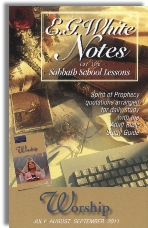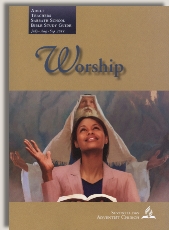|
||||||||||||||
Commentary on "Trust Not in Deceptive Words": The Prophets and Worship
Day 2: Sunday, August 21, 2011 - A Thousand Rams?
Overview
Today's lesson starts in force with an attempt at affirming the full grace of God given to the believers by faith alone. To give credit where credit is due, the author speaks of Christ's death as credited to us by faith, that only His righteousness is able to save the sinner due to sin's awful nature.
Observations
After this promising start, comes the predictable halt:
"All that being said, the Bible is clear that what we say, what we do, and what we think all matter, and these thoughts and actions reveal the reality of our experience with God."
Strictly taken, limited to this context, what is affirmed in the paragraph above is accurate. Thoughts, actions—they reveal the ups and downs, the positive and the negative aspects of somebody's spiritual experience. To a certain degree, this observation is states the obvious. Even a non-believer will find fault with Christians who just pretend to be godly while living lives no different at the moral level than heathens.
This question arises, however; why is it necessary to affirm what should be obvious—general knowledge to everyone?
The second question immediately follows: why is this statement affirming the necessity of right thoughts and deeds situated right after what is intended to be a strong, emphatic affirmation of God's grace as the only solution for sin? Affirming God's grace and affirming the necessity of right thoughts and deeds suggests that the author intended to prevent any cries of "legalism" by affirming a belief in God's grace. The affirmation of grace was given to soften the underlying belief that thoughts and deeds play a salvific role.
The problem is that the author says that "what we do, and what we think all matter", but he doesn't tell us how these things matter. His implication, however, is clear. The context established in the first paragraph is salvation, and the normal reading of the second paragraph of the lesson leads strongly to the conclusion that works matter in relation to salvation. Granted, good works constitute evidence of the believer's salvation, but given the fact that, according to Adventism, the believer is supposed to go through a process of investigation where his status is judged based on his sanctification, do not these works matter as something more than evidence of salvation? Within the framework of Adventism, deeds matter in that they are the basis of God's decision to give or keep His grace on the person who does as much as he can to obey Him.
How, then, do deeds matter in the context of an end-time judgment that's supposed to be carried out on the basis of believers' works? The author leaves this questions open, letting the readers to fill in the blanks in order to arrive at their own conclusions.
After introducing the subject of righteous deeds and thoughts but failing to conclude how they matter, thus implying their necessity but avoiding the responsibility of actually stating that belief, the author next comes back to the worship problem and introduces Micah 6:1-8 as the solution to Israel's supposed error in being obedient to God only as far as liturgy is concerned, but being disobedient by failing in moral daily duties. There is a lesson found in Michah 6 which needs to be highlighted, however—a lesson the author fails to point out.
Giving utterance to the people's plight in the face of God, Micah asks himself what kind of gift he should bring to God in order to resolve the problem of his sin. He enumerates enormous numbers of animals as sacrifices, and goes as far as to think about offering the supreme sacrifice a human being can make, the life of his own firstborn child:
"Shall I give my firstborn for my transgression, the fruit of my body for the sin of my soul?" (Micah 6:7).
The rhetorical questions receive an implicit, silent, negative answer. Instead the answer is found in God's moral requirements to be just, kind, and humble.
The author of the quarterly ends this section with a question: "What do all the right prayers, all the right styles of worship, and all the right theology mean if the person is nasty, unkind, arrogant, unjust and unmerciful to others?" As was discussed in yesterday's commentary, he operates under the assumption that Israel did the right prayers, embraced the right style of worship, had the right theology, and all they lacked was moral conduct in daily living. Unfortunately the author misses the point which Micah implicitly makes: that Israel was deadly wrong regarding worship. If they went as far as to think that maybe, maybe God will receive the life of a firstborn child as a sacrifice for the sin of the father, they worshiped as pagans no matter how apparently right were their practices.
In the supplemental questions, the author proves again that he missed the point. He asks: "What do you think is more important: correct theology or correct actions? Can you have your theology right and yet treat others in a poor manner?" In fact, the people lacked right theology; their views about sacrifices betrayed a pagan mindset, a pagan view about God, worship, and the rest. Because of this skewed view they were incapable of reformation if they were not first of all willing to repent of their pagan practices of worship. Under the appearance of liturgical faithfulness and obedience rested the heathenism of the surrounding nations.
The writer of the present review cannot restrain himself in noticing the glaring inconsistencies the author of the quarterly manifests. Obviously the former assumes that Adventists are paragons of orthodoxy, that their worship, on the "right day" is a clear manifestation of their faithfulness to God in contrast with worshiping on Sunday. The problem he deals with in the current lesson seems to be the contrast between the alleged impeccable liturgy and the moral failure which characterizes his fellow believers. Unfortunately he sees no problem with the theological package he promotes, and he doesn't learn from Micah that the weakest point is found where he thinks his position is strong.
As long as the diagnosis is faulty, the remedy will not be adequate.
Summary
- There cannot be orthodoxy of worship "forms" if there is underlying arrogance about that form.
- There cannot be orthodoxy of worship if people have pagan, unregenerate hearts.
- Worship is true and legitimate only if the person trust God and honors Him.
- Worship practices in themselves are not holy or unholy.
- Only God is holy; only people who trust the One Holy God can practice "orthodox" worship.
Copyright 2011 BibleStudiesForAdventists.com. All rights reserved. Revised August 18, 2011. This website is published by Life Assurance Ministries, Glendale, Arizona, USA, the publisher of Proclamation! Magazine. Contact email: BibleStudiesForAdventists@gmail.com.
The Sabbath School Bible Study Guide and the corresponding E.G. White Notes are published by Pacific Press Publishing Association, which is owned and operated by the Seventh-day Adventist church. The current quarter's editions are pictured above.
Official Adventist Resources
Standard Edition Study Guide Week 9
Teacher's Edition Study Guide Week 9
Easy Reading Edition Study Guide Wk 9
Search the Complete Published Ellen G. White Writings
Please Support This Project


